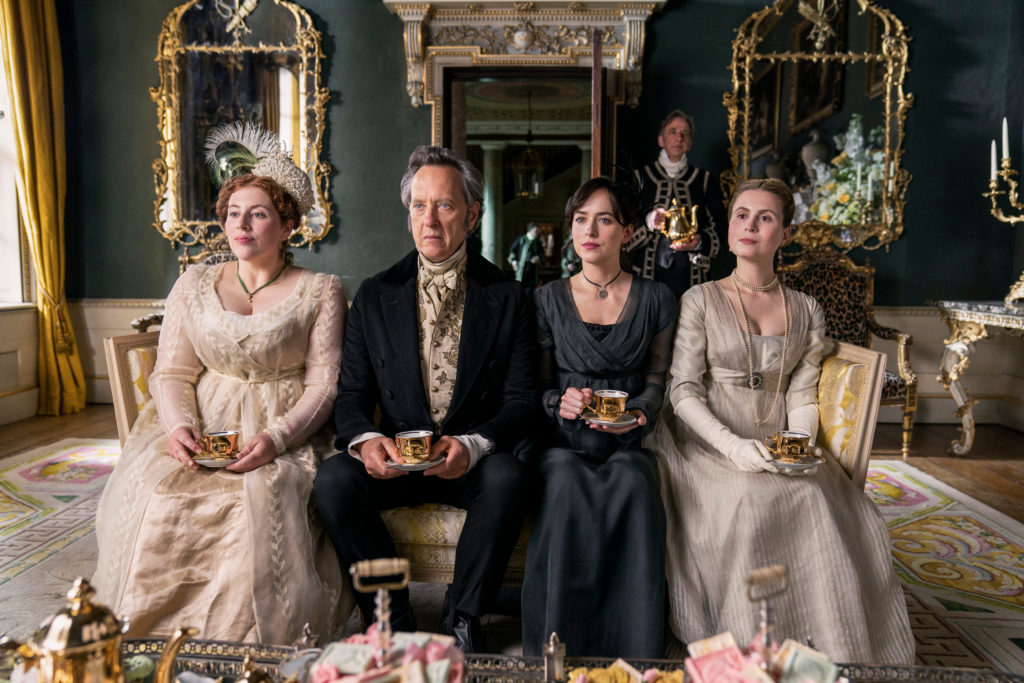Persuasion: Finally, a Jane Austen movie for people who hate Jane Austen

By Diana Beechener
Anne Elliot (Dakota Johnson: Cha Cha Real Smooth) is single and thriving—allegedly. After refusing the love of her life because he didn’t have money or titles, Anne has been stuck living with her narcissistic family and pining for the life she could have had. Her days are spent chugging wine from the bottle, rolling her eyes at her extravagant family, and petting a bunny.
But when Anne’s long-lost love returns after eight years, things have changed. Frederick Wentworth (Cosmo Jarvis: It Is In Us All) is now a captain in the Royal Navy and has made a fortune pillaging ships. He’s also the most eligible bachelor in town and flooded with admirers.
Though they form a tentative friendship, both Anne and Frederick clearly still long for each other. But new flames complicate the renewal of their affections.
Can Anne and Frederick rekindle their love? Is it possible to hear the dialogue of this movie over the agonized screams of Jane Austen fans?
(Full Disclosure: Your reviewer has a minor in Victorian and Regency literature and had to resist the urge to run screaming into the editor’s office with a 19-page treatise on everything wrong with this film. You can all thank Kathy for stopping me.)
Setting aside the film’s utter failure to capture either the spirit of the novel or the essence of any character, this version of Persuasion is just a dull, tepid romance. Director Carrie Cracknell, who transitions from theater to film with this adaptation, is so self-conscious of her work that she breaks the fourth wall every five minutes to make sure the audience is following along. Johnson addresses the camera like Ferris Bueller in a gown after every joke, winking or rolling her eyes so we know to laugh. She explains every detail of the plot, even explaining that her father’s children are her siblings—just in case anyone suffered a head wound before turning on the movie. It’s an infuriating and distracting device, made more distracting by the fact that Cracknell abandons it halfway through the film.
It’s also jarring to modernize both the language and attitudes of all the characters while keeping the period setting. Cracknell seems determined to make all the women in this film #girlbosses but gives no context for how hard that would be for women in the 1840s. Anne is blamed for not “following her heart”, but Cracknell doesn’t care to outline why that might be difficult for someone with no rights to money or property except through her spouse or male relations. Greta Gerwig’s excellent feminist adaptation of Little Women outlined how society forced women to view marriage as a monetary venture. Cracknell doesn’t care about any of this context. It’s both condescending and confounding. It’s fitting that Marie Antoinette is referenced frequently in this film because Cracknell takes a “let them eat cake” attitude to the plights facing women in this era.
But at the event horizon of this black hole of cinema is the chemistry-free relationship between Anne and Wentworth. Johnson is too busy playing Anne as a functioning alcoholic and flopping through pratfalls to bother generating any sort of connection with Jarvis. Her flat affectation and eye rolling make it hard to discern any emotion from her. But Jarvis comes out the worse for wear. He smothers any ounce of mystery or charisma surrounding Wentworth by making him the mopiest drip that ever donned a pair of breeches. There is not a moment in the film where he doesn’t behave like a kicked puppy and it’s frankly a little embarrassing to watch.
The only likeable performances in the film are that of the two antagonists. Richard E. Grant was born to play Anne’s vainglorious father. He saunters through scenes with aristocratic cruelty that is cutting and hilarious. As the nefarious Mr. Elliot, Anne’s cousin and love interest, Henry Golding shines. He steals every scene he’s in with such a winning delivery that it’s hard to understand why Anne would bother with Wentworth at all. The only time Anne stops drinking long enough to engage with anyone is when Golding draws her out. It might have been interesting to cast him as the lead (either as Anne or Wentworth, I’m not particular and he’s better than both) and see what he could do to right this ship.
If you’re a devoted fan of Austen’s, Persuasion will seem like a slap in the face. If you’ve never cared for Austen and just like period costumes and charming men, I recommend watching Bridgerton. As for this dreck, I remain half agony, half hope that other adaptations will learn from its numerous mistakes.
Persuasion is available on Netflix.
Horrendous Dramedy * PG * 107 mins.
